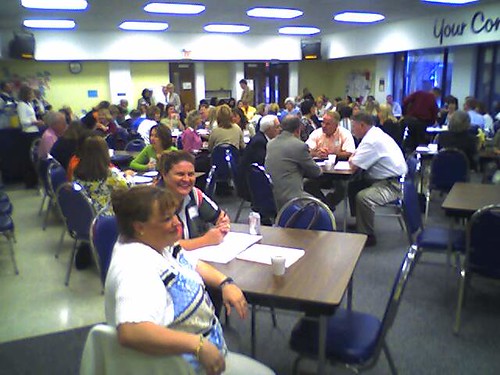The following is moblogged, so there may be some misspellings or awkward wordings.
I’m sitting in the keynote address at the New York TechForum, from Technology & Learning Magazine. The speaker is Bernie Trilling. Mr. Trilling is in charge of Think.com and ThinkQuest. It was interesting to watch their current Thinkquest promotional video. What is exciting about this project is was was so exciting about it in 1996, when I was traveling around the eastern part of the U.S. promoting the project as a strategy for integrating Internet technology into the curriculum.
He mentioned one thing that was true even then. In many cases, the student team members are from different parts of the country or different countries. The kids say, when they meet at the conference, that they don’t have accents when they collaborate online. They have to get use to their accents when they meet for the first time face-to-face.
It’s an interesting concept, that people don’t have accents online.
Inn
He lists the incremental innovation process from IDEO, an innovations firm.
- Understand
- Observe and question
- Visuali and prototype
- Evaluate and refine
- Implement
Do we teach this?
The history of educational technology in three little words
From — learning from technology
About — learning about technology
With — learning with technology
So what does change mean in an information environment?
- top-down — with top down change, things still look pretty much the same.
- Bottom-up — they change, but it may go back down.
- Mixed-mode — Same as above
- Transformational Change — The Changes changes how things are done (he does a great little demo here with an expanding globe toy)
- transformational inside-out — Same as above — things pop.
“Change is a nother word for growth and an synonym for learning.”
ICT means Information & Communication Technologies
ICT should mean Innovation, Collaboration and Transformation
Bill MacKenty, a public elementary school teacher in Martha’s Vineyard (OK, it’s Martha’s Vineyard), is presenting as the third of a panel on games in education. He read to us a phrase from a gaming types short-cuts sheet that was totally incomprehensible to me — and most of the other attendees, I dare say. Then he asked the question…
Why do students who have been labeled as learning disabled, seem to intuitively be able to read and use this kind of information?
Powerful!
I asked a question during the Q&A session, “What are the big cool things about video games that draw our students’ attention”. I recorded their answers, so this may be in a future podcast. But one of the panelists said that in video games, the rules are real. This is very cool to me. As we teaching in our classrooms, rules tend to be very abstract. They are, much of the time, the objective of instruction. In a video game, rules are something that you actually bump up against. They provide real limits and real opportunities for accomplishing your goal.

 Perhaps one of the best small conferences around is Technology & Learning’s
Perhaps one of the best small conferences around is Technology & Learning’s 